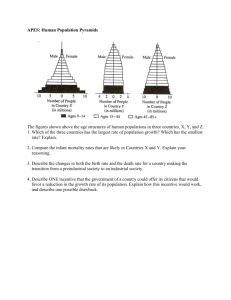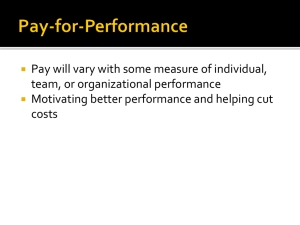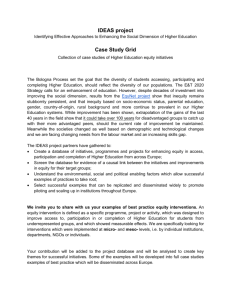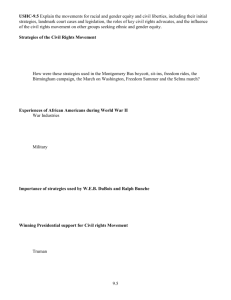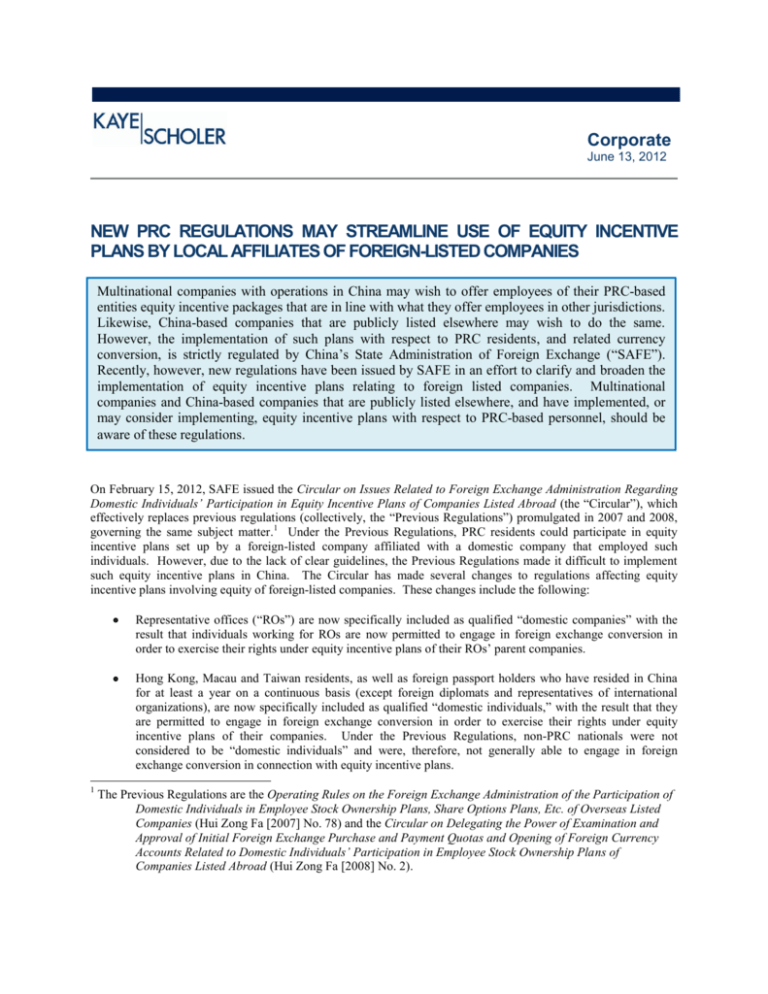
Corporate
June 13, 2012
NEW PRC REGULATIONS MAY STREAMLINE USE OF EQUITY INCENTIVE
PLANS BY LOCAL AFFILIATES OF FOREIGN-LISTED COMPANIES
Multinational companies with operations in China may wish to offer employees of their PRC-based
entities equity incentive packages that are in line with what they offer employees in other jurisdictions.
Likewise, China-based companies that are publicly listed elsewhere may wish to do the same.
However, the implementation of such plans with respect to PRC residents, and related currency
conversion, is strictly regulated by China’s State Administration of Foreign Exchange (“SAFE”).
Recently, however, new regulations have been issued by SAFE in an effort to clarify and broaden the
implementation of equity incentive plans relating to foreign listed companies. Multinational
companies and China-based companies that are publicly listed elsewhere, and have implemented, or
may consider implementing, equity incentive plans with respect to PRC-based personnel, should be
aware of these regulations.
On February 15, 2012, SAFE issued the Circular on Issues Related to Foreign Exchange Administration Regarding
Domestic Individuals’ Participation in Equity Incentive Plans of Companies Listed Abroad (the “Circular”), which
effectively replaces previous regulations (collectively, the “Previous Regulations”) promulgated in 2007 and 2008,
governing the same subject matter.1 Under the Previous Regulations, PRC residents could participate in equity
incentive plans set up by a foreign-listed company affiliated with a domestic company that employed such
individuals. However, due to the lack of clear guidelines, the Previous Regulations made it difficult to implement
such equity incentive plans in China. The Circular has made several changes to regulations affecting equity
incentive plans involving equity of foreign-listed companies. These changes include the following:
Representative offices (“ROs”) are now specifically included as qualified “domestic companies” with the
result that individuals working for ROs are now permitted to engage in foreign exchange conversion in
order to exercise their rights under equity incentive plans of their ROs’ parent companies.
Hong Kong, Macau and Taiwan residents, as well as foreign passport holders who have resided in China
for at least a year on a continuous basis (except foreign diplomats and representatives of international
organizations), are now specifically included as qualified “domestic individuals,” with the result that they
are permitted to engage in foreign exchange conversion in order to exercise their rights under equity
incentive plans of their companies. Under the Previous Regulations, non-PRC nationals were not
considered to be “domestic individuals” and were, therefore, not generally able to engage in foreign
exchange conversion in connection with equity incentive plans.
1
The Previous Regulations are the Operating Rules on the Foreign Exchange Administration of the Participation of
Domestic Individuals in Employee Stock Ownership Plans, Share Options Plans, Etc. of Overseas Listed
Companies (Hui Zong Fa [2007] No. 78) and the Circular on Delegating the Power of Examination and
Approval of Initial Foreign Exchange Purchase and Payment Quotas and Opening of Foreign Currency
Accounts Related to Domestic Individuals’ Participation in Employee Stock Ownership Plans of
Companies Listed Abroad (Hui Zong Fa [2008] No. 2).
Corporate – June 13, 2012
The Circular provides that directors, supervisors, senior management and other individuals who have an
employment or service relationship with a domestic company, potentially including independent
contractors, may participate in equity incentive plans of related foreign-listed companies, whereas the
Previous Regulations were not explicit in defining the relationship one must have with the companies in
order to participate in their equity incentive plans.
The Circular covers not only employee stock ownership plans and stock option plans, which were covered
under the Previous Regulations, but also plans involving share appreciation rights, restricted shares,
performance shares and phantom shares, as well as other plans that SAFE may approve.
A unified, streamlined process is adopted for the implementation of all types of equity incentive plans,
whereas under the Previous Regulations, two different processes were prescribed for either “employee
stock ownership plans” or “stock option plans,” respectively. PRC domestic affiliates or operating
companies of foreign-listed companies (or a domestic asset custodian agency entrusted by such domestic
companies) are required to handle matters such as foreign exchange registration, onshore account opening,
funds transfer and remittance, while the mechanism for actual exercise of options, purchase and sale of
related stocks or equity, and transfer of funds would be handled offshore. The Circular has also reduced
the number of documents required for registration.
Generally speaking, the Circular provides multinational companies and China-based companies that are publicly
listed elsewhere more options to implement their equity incentive plans and to allow a broader scope of qualified
participants. It reflects China’s overall plan to relax its control on capital account transactions and move towards
gradual RMB convertibility. In fact, officials from various SAFE branches have indicated that the Circular should
not be viewed as imposing any new SAFE filing requirements.
Of course, as with the implementation of any new rule or policy in China, actual practice by different SAFE
branches can still vary. For example, one SAFE branch indicated that the Circular actually requires all equity
incentive plans mentioned therein to be registered with SAFE, regardless of whether or not participants would
engage in foreign exchange conversion transactions in order to exercise their rights under such plans. If this is
indeed the case going forward, then the Circular could create an additional SAFE registration burden for many
companies. This may explain why some commentators have interpreted the Circular as an attempt by SAFE to
increase its control over equity incentive plans generally.
Therefore, it is important for companies with existing equity incentive plans that have not been registered with
SAFE previously, but which may now qualify under the Circular, to determine (i) whether it is desirable to register
such plans in order to broaden participation and allow more qualified individuals to engage in foreign exchange
conversion transactions to exercise their rights thereunder, and/or (ii) whether the relevant local SAFE branch may
adopt the view and practice of requiring registration across the board, regardless of whether participants would need
to engage in foreign exchange conversion transactions to exercise their rights under such plans. Overall, it would
seem that at least there is no harm in registering existing equity incentive plans with SAFE.
For companies with existing equity incentive plans that have already been registered with SAFE under the Previous
Regulations, such plans will likely need to be registered again in accordance with the Circular. It should also be
noted that certain protocol relating to registered plans has changed, e.g., plan records must be submitted to the local
SAFE within the first three working days of each quarter, instead of within ten working days under the Previous
Regulations. Additionally, the Circular provides that Chinese versions of the materials submitted to the authorities
should prevail over other language versions, so it is important to ensure that any documents originally prepared in
English are well translated.
Finally, for companies that wish to adopt new equity incentive plans in China, these new plans will need to be
registered with SAFE in accordance with the Circular if participants would engage in foreign exchange transactions
2
Corporate – June 13, 2012
in order to exercise their rights thereunder or if the applicable local SAFE determines that such registration is
required regardless of whether or not participants would engage in foreign exchange transactions.
Overall, having a unified equity incentive plan that covers all relevant PRC-based individuals associated with the
company is now likely feasible for many PRC entities affiliated with a foreign-listed company. This is good
progress.
For more information, please contact:
Yingxi Fu-Tomlinson
e-mail: yfu@kayescholer.com
Steven Wright
e-mail: stwright@kayescholer.com
www.kayescholer.com
Chicago
+1.312.583.2300
Frankfurt
+49.69.25494.0
London
+44.20.7105.0500
Los Angeles
+1.310.788.1000
New York
+1.212.836.8000
Palo Alto
+1.650.319.4500
Shanghai
+86.21.2208.3600
Washington, DC
+1.202.682.3500
West Palm Beach
+1.561.802.3230
Copyright ©2012 by Kaye Scholer LLP. All Rights Reserved. This publication is intended as a general guide only. It does not
contain a general legal analysis or constitute an opinion of Kaye Scholer LLP or any member of the firm on the legal issues
described. It is recommended that readers not rely on this general guide but that professional advice be sought in connection with
individual matters. Attorney Advertising: Prior results do not guarantee future outcomes.
3

